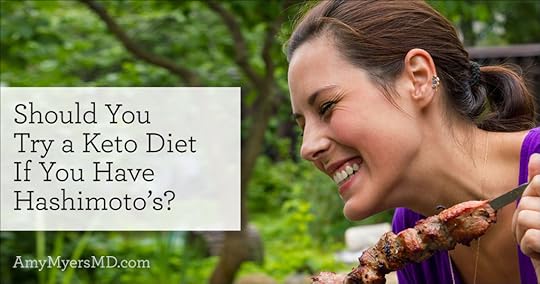Should You Try a Keto Diet if You Have Hashimoto’s?


Ketogenic (or “keto”) diets are all the rage right now. Along with helping you lose weight and increase your energy levels, keto diets have the potential to reverse a number of chronic illnesses, from diabetes, to cancer, and even certain autoimmune diseases. For this reason, you may be wondering if you should try a keto diet if you have Hashimoto’s.
While everyone reacts differently to keto diets–or any diet for that matter–there are a few key factors to consider before jumping on the keto bandwagon if you have Hashimoto’s or any other autoimmune thyroid condition.
The Keto Diet and Hashimoto’s
What is the Keto Diet?
The keto diet is a very low-carb diet that emphasizes high fat intake and includes moderate amounts of protein. Carbohydrates on a “true” keto diet are restricted to roughly 5% of your daily calories (about 20-30g), compared to a standard diet that gets 45-60% (225-325g) of daily calories from carbs.
Your body’s main source of fuel is glucose, which comes from carbohydrates. However, when you replace the carbs in your diet with lots of healthy fats, your body enters a metabolic state known as “ketosis,” which burns stored fat for fuel instead of glucose.
Studies have shown that following a keto diet can support a healthy immune response and increase your body’s glutathione levels, which are notoriously low in people with autoimmunity.1 Although keto may be helpful for some autoimmune conditions, it might not be the best option when it comes to Hashimoto’s, and I explain why below.
The Effect of a Keto Diet on Thyroid Function
The problem with a keto diet if you have Hashimoto’s is that the parts of your brain that regulate thyroid hormones–the hypothalamus and the pituitary gland–require glucose to function.2 In fact, Thyroid Stimulating Hormone (TSH) is partly made up of glucose molecules. Severe carbohydrate restriction significantly reduces the amount of Free T3 (FT3) and increases Reverse T3 (RT3).3 When you have Hashimoto’s, your thyroid is already under-producing its hormones in a state known as hypothyroidism. Having too much RT3 and not enough FT3 can exacerbate hypothyroid symptoms.
For this reason, it’s best to proceed with caution if you have Hashimoto’s and wish to experiment with a keto diet. Another option is to try a “modified” keto diet, where you eat at least 50g of carbs per day. No adverse effects on thyroid hormone production were found at this level of carb intake.
The most important dietary change you should make if you have Hashimoto’s is to remove all toxic and inflammatory foods from your diet, especially gluten. I walk you through exactly how to optimize your diet for thyroid function, including a 28-day meal plan with specially designed (and delicious!) recipes, in my New York Times Bestseller, The Thyroid Connection.
How to Follow a Keto Diet if You Have an Autoimmune Disease
While it’s best to be cautious when making extreme dietary changes, I do want to emphasize that no two people are alike, especially when it comes to what we eat. You may find that even with Hashimoto’s, you do extremely well on a keto diet! Just be sure to consult with your doctor before making the transition, and monitor your thyroid levels closely while following a keto diet.
To learn more about the health benefits of keto, how to follow a keto diet if you have autoimmunity, and what supplements you can take to support yourself while on a keto diet, see my other article on this topic: Should You Try a Keto Diet if You Have an Autoimmune Disease?
The post Should You Try a Keto Diet if You Have Hashimoto’s? appeared first on Amy Myers MD.
Amy Myers's Blog
- Amy Myers's profile
- 74 followers



